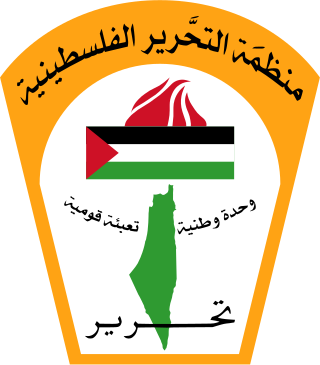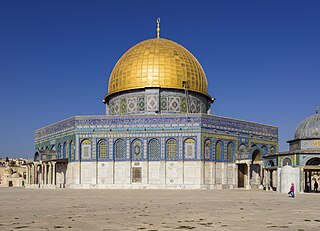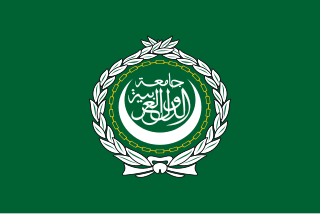
The Palestine Liberation Organization is a Palestinian nationalist coalition that is internationally recognized as the official representative of the Palestinian people. Founded in 1964, it initially sought to establish an Arab state over the entire territory of the former Mandatory Palestine, advocating the elimination of the State of Israel. However, in 1993, the PLO recognized Israeli sovereignty with the Oslo I Accord, and now only seeks Arab statehood in the Palestinian territories that have been militarily occupied by Israel since the 1967 Arab–Israeli War.

The Israeli–Palestinian conflict is an ongoing military and political conflict about land and self-determination within the territory of the former Mandatory Palestine. Key aspects of the conflict include the Israeli occupation of the West Bank and Gaza Strip, the status of Jerusalem, Israeli settlements, borders, security, water rights, the permit regime, Palestinian freedom of movement, and the Palestinian right of return.

United Nations Security Council Resolution 242 (S/RES/242) was adopted unanimously by the UN Security Council on November 22, 1967, in the aftermath of the Six-Day War. It was adopted under Chapter VI of the UN Charter. The resolution was sponsored by British ambassador Lord Caradon and was one of five drafts under consideration.

The history of the State of Palestine describes the creation and evolution of the State of Palestine in the West Bank and Gaza Strip. During the Mandatory period, numerous plans of partition of Palestine were proposed but without the agreement of all parties. In 1947, the United Nations Partition Plan for Palestine was voted for. The leaders of the Jewish Agency for Palestine accepted parts of the plan, while Arab leaders refused it. This triggered the 1947–1949 Palestine war and led, in 1948, to the establishment of the state of Israel on a part of Mandate Palestine as the Mandate came to an end.

The Arab League, formally the League of Arab States, is a regional organization in the Arab world. The Arab League was formed in Cairo on 22 March 1945, initially with seven members: Egypt, Iraq, Transjordan, Lebanon, Saudi Arabia, Syria, and North Yemen. Currently, the League has 22 members.

The Palestinian territories, also known as the Occupied Palestinian Territory, consist of the West Bank and the Gaza Strip—two regions of the former British Mandate for Palestine that have been occupied by Israel since the Six-Day War of 1967.

The Camp David Accords were a pair of political agreements signed by Egyptian President Anwar Sadat and Israeli Prime Minister Menachem Begin on 17 September 1978, following twelve days of secret negotiations at Camp David, the country retreat of the President of the United States in Maryland. The two framework agreements were signed at the White House and were witnessed by President Jimmy Carter. The second of these frameworks led directly to the 1979 Egypt–Israel peace treaty. Due to the agreement, Sadat and Begin received the shared 1978 Nobel Peace Prize. The first framework, which dealt with the Palestinian territories, was written without participation of the Palestinians and was condemned by the United Nations.

Intermittent discussions are held by various parties and proposals put forward in an attempt to resolve the ongoing Israeli–Palestinian conflict through a peace process. Since the 1970s, there has been a parallel effort made to find terms upon which peace can be agreed to in both the Arab–Israeli conflict and in the Palestinian–Israeli conflict. Notably the Camp David Accords between Egypt and Israel, which included discussions on plans for "Palestinian autonomy", but did not include any Palestinian representatives. The autonomy plan would not be implemented, but its stipulations would to a large extent be represented in the Oslo Accords.
The Arab League was formed in Cairo on 22 March 1945 with six members: Egypt, Iraq, Transjordan, Lebanon, Saudi Arabia, and Syria. Yemen joined on 5 May 1945. Since its formation the Arab League has promoted the Palestinian Arab cause in the Israeli–Palestinian conflict, including by imposing the Arab League boycott of Israel. The Arab League opposed the United Nations Partition Plan for Palestine in 1947. On 15 May 1948, the then seven Arab League members coordinated an invasion of what was by then the former British Mandate, marking the start of the 1948 Arab–Israeli War.
The International law bearing on issues of Arab–Israeli conflict, which became a major arena of regional and international tension since the birth of Israel in 1948, resulting in several disputes between a number of Arab countries and Israel.

The Steadfastness and Confrontation Front was a political initiative of 4 December 1977 by the Palestine Liberation Organization (PLO) and the governments of Libya, Algeria, Syria and South Yemen following the visit by Egyptian President Anwar Sadat to Israel on 19 November 1977, which was widely seen in the Arab world as an abandonment of the previously-agreed principle of withholding recognition of Israel and as breaking the Arab alliance against Israel.
The Arab–Israeli conflict began in the 20th century, evolving from earlier Intercommunal violence in Mandatory Palestine. The conflict became a major international issue with the birth of Israel in 1948. The Arab–Israeli conflict has resulted in at least five major wars and a number of minor conflicts. It has also been the source of two major Palestinian uprisings (intifadas).

The Arab Peace Initiative, also known as the Saudi Initiative, is a 10 sentence proposal for an end to the Arab–Israeli conflict that was endorsed by the Arab League in 2002 at the Beirut Summit and re-endorsed at the 2007 and at the 2017 Arab League summits. The initiative offers normalisation of relations by the Arab world with Israel, in return for a full withdrawal by Israel from the occupied territories, with the possibility of comparable and mutual agreed minor swaps of the land between Israel and Palestine, a "just settlement" of the Palestinian refugee problem based on UN Resolution 194, and the establishment of a Palestinian state with East Jerusalem as its capital. A Palestinian attack called the Passover massacre took place on 27 March 2002, the day before the Initiative was published, which initially overshadowed it.

The Arab–Israeli conflict is the phenomenon involving political tension, military conflicts, and other disputes between various Arab countries and Israel, which escalated during the 20th century. The roots of the Arab–Israeli conflict have been attributed to the support by Arab League member countries for the Palestinians, a fellow League member, in the ongoing Israeli–Palestinian conflict; this in turn has been attributed to the simultaneous rise of Zionism and Arab nationalism towards the end of the 19th century, though the two national movements had not clashed until the 1920s.

Political relations between the State of Palestine and the United States have been complex and strained since the 1960s. While the U.S. does not recognize the State of Palestine, it recognizes the Palestine Liberation Organization (PLO) as the legitimate representative entity for the Palestinian people; following the Oslo Accords, it recognized the Palestinian National Authority as the legitimate Palestinian government of the Palestinian territories.
The Arab League has 22 member states. It was founded in Cairo in March 1945 with seven members: the Kingdom of Egypt, Kingdom of Iraq, Lebanon, Saudi Arabia, Syrian Republic, Transjordan, and North Yemen. Membership increased during the second half of the 20th century. Seven countries have observer status. The headquarters are located in Cairo, Egypt.

The Israeli Peace Initiative is a compromise plan given by the political left within Israel in response to the Arab Peace Initiative issued by the Arab League in 2002 and again in 2007. It was released on April 6, 2011. It compromises with the Palestinians in an effort to establish peace in Israel. One of the key differences from other peace plans is that the Israeli Peace Initiative proposes a complete withdrawal of Israeli forces from the Gaza Strip and the West Bank. It also calls for the establishment of the Temple Mount as neutral ground between Palestine and Israel, and the retention of the Jewish Quarter of the Old City within Israel. Additionally, the peace plan addresses Israel's relations with its Arab neighbors, including settling the dispute over the Golan Heights, territory that Israel captured from Syria in the Six-Day War.

The Syrian peace process is the ensemble of initiatives and plans to resolve the Syrian civil war, which has been ongoing in Syria since 2011 and has spilled beyond its borders. The peace process has been moderated by the Arab League, the UN Special Envoy on Syria, Russia and Western powers. The negotiating parties to end the conflict are typically representatives of the Syrian Ba'athist government and Syrian opposition, while the Autonomous Administration of North and East Syria is usually excluded at the insistence of Turkey. Radical Salafist forces including the Islamic State of Iraq and the Levant have not engaged in any contacts on peaceful resolution to the conflict.

On December 19, 2011, the Syrian government agreed to allow foreign observers from the Arab League to monitor Syria's progress in removing troops from protest areas, free political prisoners, and negotiate with dissidents. The mission was in accordance with the Arab League peace plan aimed to resolve the Syrian crisis. The monitors were dispatched and supported by the Arab League.

The Vienna peace talks for Syria, as of 14 November 2015 known as the talks of the International Syria Support Group (ISSG), were negotiations of foreign powers that began in Vienna, Austria in October 2015 at the level of foreign ministers, to resolve the conflict in Syria, after unsuccessful previous Syrian peace initiatives.















